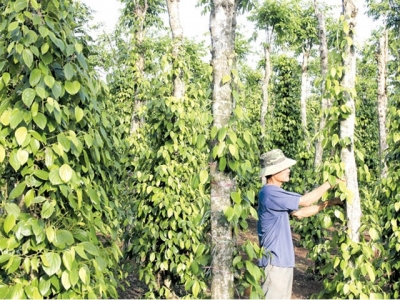Vietnams pepper industry bears price shock

Vietnam’s pepper industry is sustaining a blow in the face of a surplus in the world market.
Vietnam exported 215,000 tons of pepper in 2017
According to the General Department of Customs (GDC), in 2017 Vietnam exported 215,000 tons of pepper worth $1.2 billion, a 20 percent increase in quantity compared with the same period last year, but a 22.2 percent decrease in value.
Nguyen Nam Hai, chair of the Vietnam Pepper Association (VPA), said the total pepper output in the world in 2017 was 40,000 tons higher than 2016, while the output in 2018 is expected to be 80,000 tons higher.
The continued pepper price increase in the last 10 years led to Vietnamese farmers expanding the pepper growing area.
By 2017, the total pepper area had reached 152,000 hectares and the output was VND240,000 tons, amounting to 48 percent of the total output of the world.
This contributed to a global price decrease. In 2017, the pepper price fell from $11.33 per kilogram to $4.78.
According to the Ba Ria – Vung Tau Pepper Association, the current pepper growing area in the province is 13,000 hectares, far exceeding the area of 8,500 hectares the local authorities planned for 2030.
In 2017 Vietnam exported 215,000 tons of pepper worth $1.2 billion, a 20 percent increase in quantity compared with the same period last year, but a 22.2 percent decrease in value.
The same situation is occurring in many pepper growing provinces.
Willem Van Walt Meijer, managing director of Nedspice Vietnam, confirmed that exports now had not gone smoothly as seen in the past. The big stocks have forced the prices down, thus shrinking the profits of pepper exporters.
India, one of Vietnam’s major export markets, has restricted imports to protect the domestic pepper industry. The Indian government has high taxes on imports. Meanwhile, the US and some European countries have set up technical barriers against Vietnam’s pepper.
Vietnam now has to compete fiercely with emerging rivals. Brazil, for example, produces high-quality pepper which nearly meets the standards of organic pepper.
Cambodia, which is e landing pepper farming, is predicted to become the third or fourth largest pepper exporter in the next few years.
An analyst said it is unpredictable when the pepper price recovers. The export volume globally has increased by 20 percent per annum, while the world’s demand increased by 5 percent only, which means that big stocks cannot be cleared within a short time.
According to Hai, to ensure the sustainable development of the pepper industry, it is necessary to restructure the growing area.
He suggested that exporters join forces with farmers to generate clean material areas, saying that if Vietnam doesn’t have high-quality pepper, its products will be uncompetitive with products from Brazil, Malaysia and Indonesia.
Related news
 Internet of Things helps farmers boost, improve production
Internet of Things helps farmers boost, improve production The fourth industrial revolution enables Vietnam’s agricultural businesses and farmers apply the Internet of Things (IoT) to control and monitor production.
 Bac Giang lychee offered to USA and Netherlands
Bac Giang lychee offered to USA and Netherlands Two tonnes of lychees in Hong Giang commune was bought on June 12 by Ben Tre province – based Chanh Thu Fruit Export Company Limited (company)
 New technique helps remove chemical contaminants from water systems
New technique helps remove chemical contaminants from water systems Series of continuous-flow photoreactors to effectively remove chemical products and compounds, including pharmaceuticals and antibiotic residues